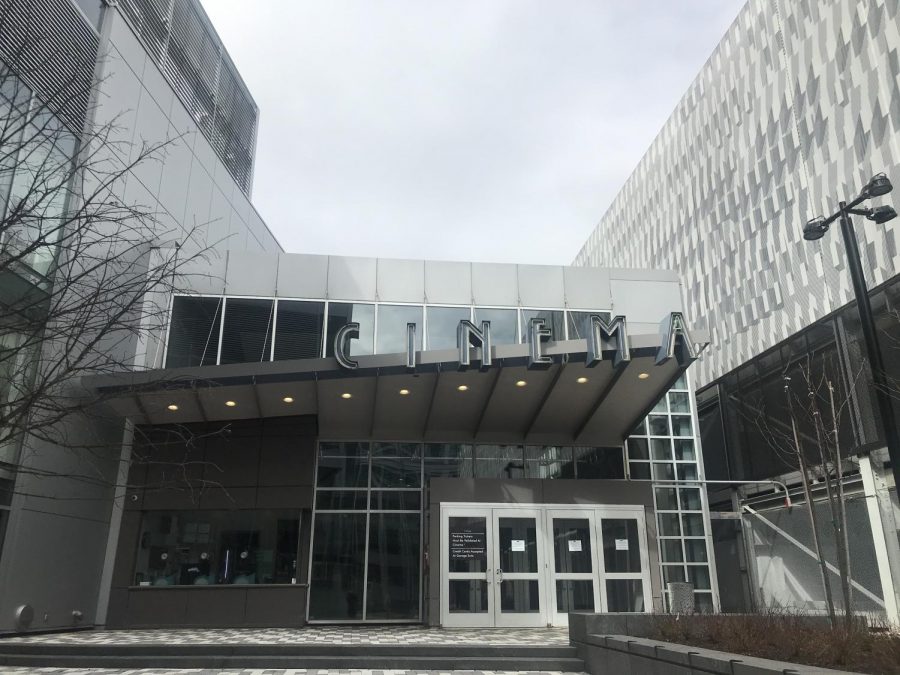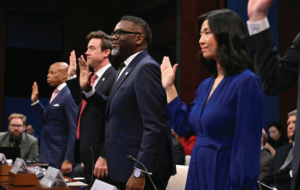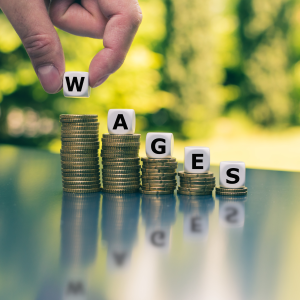Coronavirus Shuts Down Live Entertainment
Music, Theater, and Film Have Been Some of the Industries Hardest Hit by the Coronavirus Pandemic
Pictured: The empty Kendall Square Cinema in Cambridge.
April 25, 2020
On March 12th, Broadway announced that it would be canceling all performances for an indefinite amount of time due to the growing coronavirus outbreak. Thousands of workers in the New York theater scene were left suddenly unemployed in one of the most costly cities to live in the world. Shows set to open throughout that month were closed before they had played even their opening nights—Hangmen and Who’s Afraid of Virginia Woolf were both only in previews when Broadway announced the closures. Broadway announced an extension to its closure in April, resulting in fan-beloved Beetlejuice announcing its closure without having played a proper final performance. It wasn’t known in March, but Broadway’s announcement would foreshadow the shutdown of the entertainment industry at large in the following weeks.
That same week, the movie box office had record low ticket sales, raking in only 55 million dollars in its lowest-grossing weekend in over 20 years, as reported by Comscore. In comparison, Avengers: End Game alone made seven times more than that in its opening weekend. Disney’s new film Onward had the highest-gross that weekend in what was one of Disney’s lowest-grossing openings ever—an indication that even the biggest film company in the world might struggle throughout this crisis. In a quick response to these underwhelming numbers, film companies moved spring release dates to late summer and fall openings. To name a few, the release dates of A Quiet Place Part II, Wonder Woman 1984, Black Widow, and No Time To Die, the latest James Bond offering, have all been postponed.
Similarly, many major music events have been postponed or canceled altogether. Major touring artists such as BTS, Camila Cabello, and Justin Bieber all postponed legs of their tour. Coachella, American pop music’s supposedly most anticipated music festival, was postponed to October from its original April date. Boston’s own Boston Calling festival scheduled for Memorial Day weekend was canceled entirely. This brings forth a big reason why the entertainment industry is being hit so brutally- it relies heavily on large crowds congregating, whether it be in a theater or venue, which amid a pandemic would exponentially worsen the situation with vast amounts of people coming in contact. Concerts, festivals, plays, and movies are all businesses that rely on big audiences in this way, and cannot occur during a socially distancing based lifestyle.
However, it is notable that the artists who are signed to record labels or who are working for these big-budget movies are faring significantly better than the vast majority of artists during this crisis. Through their support from renowned institutions, they can afford to miss a month of work, whereas local artists and local art venues often rely on day-to-day checks to get by, so a three month period of no work could result in devastation for many of them. In the Boston area, many local venues have been very supportive of their artists, sending out emergency funds to performers as a temporary support system. Club Passim, a local club in Harvard Square, raised money through virtual concert live streams to support any musicians that have performed at their venue. Beginning mid-March, Boston and Cambridge both started funding grants for local musicians and art organizations. On a larger scale, The Artist Relief Fund is a national emergency fund giving out grants of $5000 to visual artists and musical artists alike through a simple online application.
In today’s age where streaming had overtaken the television and music industries pre-pandemic, streaming has helped consumers stay in touch and continue to enjoy art in self-quarantine. Disney+, Disney’s new streaming platform released November of 2019, rapidly saw an increase in its subscribers, almost doubling from February’s 26 million to 50 million in April. Nielson reported that streaming viewership had increased 22% the week of March 16. Major streaming services started acquiring and releasing more films to follow suit—Hulu acquired Oscar-winner Parasite, and three other Bong Joon-Ho films if you were in need of something to watch to pass time.
However, the irony remains that big studios still manage to win in the end, as small artists are drowned out by the American society’s consumerist values. If you are looking for ways to support local artists, consider donating to funds like the Boston Artist Relief Fund, or buying merchandise online from a local band. Buying gift cards online for a local art store is another alternative, while stores deemed non-essential remain shutdown.
Will the entertainment industry bounce back to its previous success as soon as the coronavirus pandemic blows over? It’s hard to say—as reported by the Motion Picture Association, the film and television industries peaked at an all-time high in 2019, recording over 100 billion dollars in revenue. As long as consumers start buying movie tickets at the same rate as before, the industry may be able to recover quickly. However, the impact of COVID-19 on entertainment will likely be forever felt, as many lesser-known artists who were hoping that 2020 would be their year might never have their shot at Hollywood success. If anything’s for sure, art will always manage to find a way to be seen, even through all the chaos and the noise.









